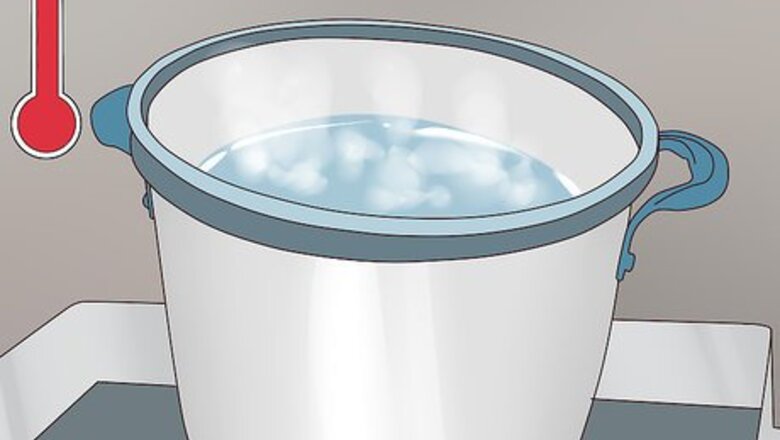
views
Using Boiling Water
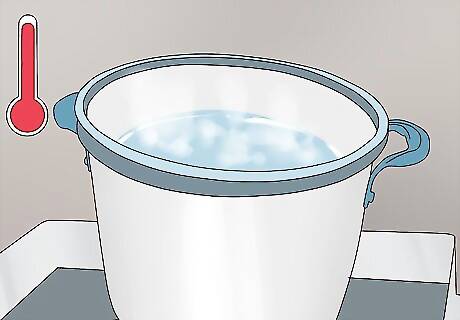
Heat a pot of water to boiling. Add water to a large cooking pot and place it on the stovetop over a high temperature. Wait for the water to begin boiling and then turn the stovetop off immediately once it does. Alternatively, you can also boil water in a kettle and then transfer it into the pot if you prefer. If you have any concerns about if the pot is large enough, place the garment inside to check it first before you add the water.
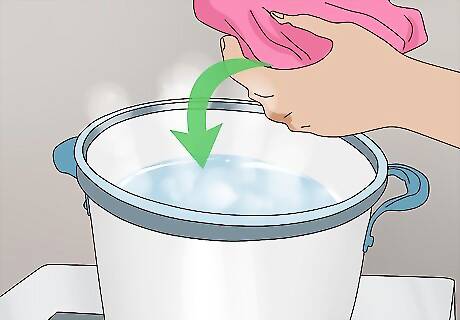
Place the garment into the boiling water. Carefully drop the garment into the pot of boiling water. You may need to use a cooking utensil like a wooden spoon to push the garment into the water so you don't burn your hands. Make sure that the whole garment is fully submerged. You could use cooking tongs to place the garment into the water.
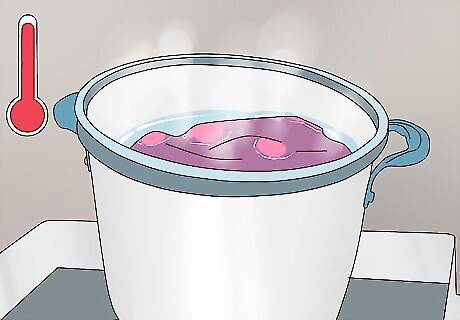
Soak the garment for up 30 minutes to shrink it. You don’t need to agitate the water or turn the stovetop back on as the garment will shrink by itself. Use cooking tongs to remove the garment once the time is up and place it in a laundry bucket to prevent water from dripping everywhere. The amount of time that you need to leave the garment in the boiling water for depends on how much you want it to shrink and the type of fabric. Silk tends to shrink very fast, so simply immerse the silk in the boiling water and then remove it again to shrink it. Cotton also tends to shrink relatively fast. It usually takes 5-10 minutes. Polyester and denim garments take the longest to shrink, so it’s likely that you will need to soak them for 20-30 minutes.
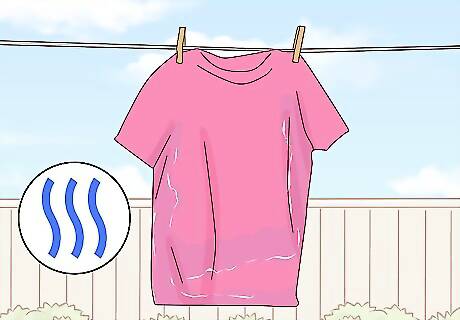
Let the garment air-dry. Use clothespins to hang the garment up on a clothesline or lay the item out on a clotheshorse. The garment will probably take longer to dry than usual because of the excess water. If the garment is made of wool, lay it flat to dry to prevent the fibers from stretching back out. Avoid wringing out the garment, as this can cause the fabric fibers to stretch.
Ironing Damp Clothing
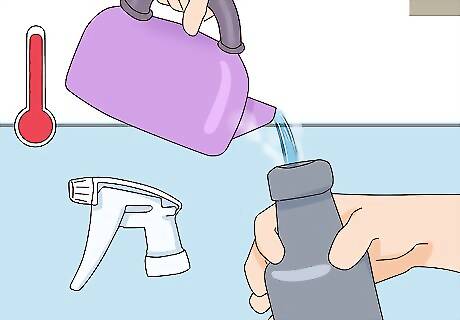
Fill a spray bottle with warm water. The warm water is for dampening the garment, helping it to shrink more readily when it’s ironed. Get a clean spray bottle and hold it under warm, running water. Then screw the spray cap back on when the bottle is full and gently tip it upside down to make sure that it doesn’t leak. If your garment is already damp, you won’t need the spray bottle or to mist it with water.
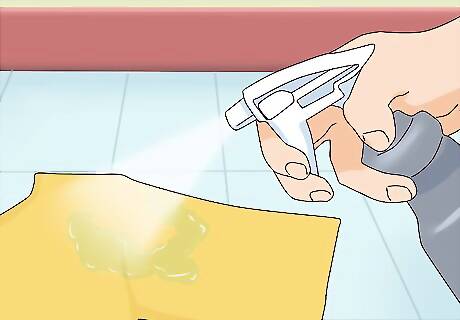
Use the spray bottle to lightly dampen the garment. Lay the part of the garment that you want to begin with flat on the ironing board. Lightly mist the fabric until it feels damp to touch. The fabric doesn’t need to be saturated. Shrinking garments by ironing is great if you want to shrink just one part, such as a collar or a sleeve. Iron shrinking is ideal for cotton, wool, and denim. Don’t attempt to shrink polyester garments using an iron, as the colors will fade and it’s easy to cause irreversible damage. Use the boiling water or washing machine method instead.
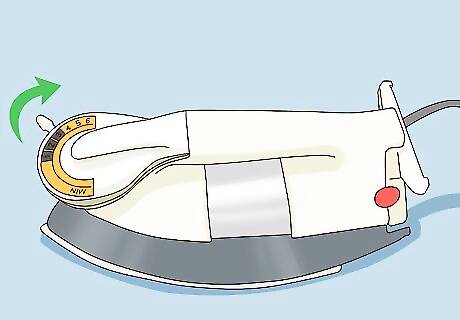
Set the iron temperature to the appropriate setting. Turn the iron on and look at the different temperature settings available. Pick the one that matches the type of fabric you're working with. Wool garments need a low temperature setting while cotton and denim require higher heats. If you are unsure about what temperature to use, read the care instructions on the garment label.
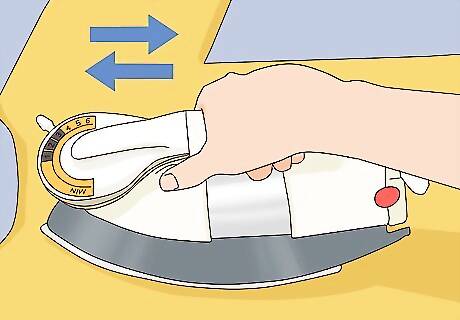
Iron the garment until it feels dry. Run the iron slowly and carefully over the fabric. Avoid letting the iron rest in one place for too long on the fabric, as this could cause it to burn. Feel the fabric as you iron to check when it no longer feels damp. You should be able to tell that the fabric has shrunk! If the fabric dries before you get a chance to iron it, simply mist it again with the warm water. If you have any concerns about the iron damaging the garment, put a cotton cloth over the garment first and then iron over the cloth.
Shrinking Clothes in a Washing Machine
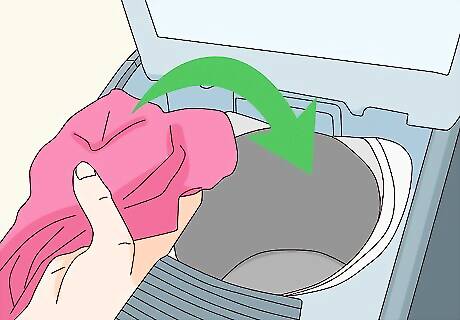
Put the garment into the washing machine alone. Open the washing machine door, place the garment inside, and then shut the door firmly. Always wash only the garment that you want to shrink, as otherwise, the other items might shrink too! This also stops the color of bright or vivid garments from bleeding into other clothing. You can shrink multiple items together if they are all a similar color and the same type of fabric. Cotton, denim, polyester, and wool can all shrink well in the washing machine.
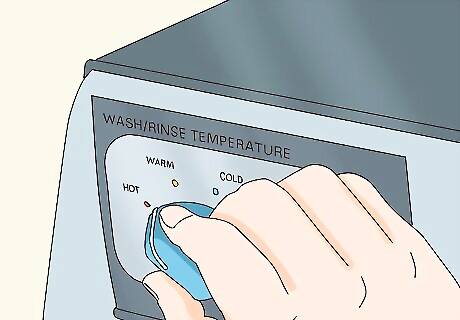
Adjust the temperature setting on the machine to hot. Turn on the washing machine and switch the temperature to the highest setting available. This means that the machine will use very hot water to wash the garment, which gives it the best possible chance of shrinking. Clothing fibers are stretched during manufacturing due to stress. Hot water releases the stress and the fibers spring down to a smaller size.
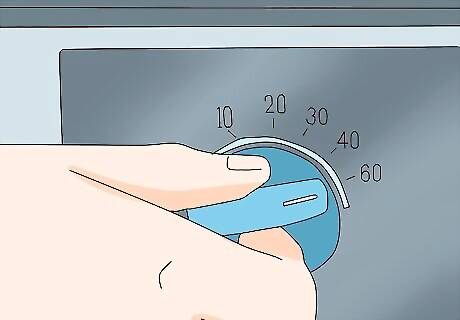
Set the time setting to the maximum and start the cycle. To properly shrink a garment just using a washing machine, the water needs to be very hot and the garment needs to be in there for as long as possible. Pick the longest cycle length and then press the start button once the settings are correct. You don’t need to add any laundry detergent to the machine unless you want to wash the garment at the same time. It will shrink regardless. Remember that there is no surefire way to guess how much a wool item will shrink. Some can go from XL to infant size, while others can go from XL to medium, since the fabric is highly unpredictable. If you're shrinking cotton, you can expect it to shrink by 20%. There's no need to keep the garment submerged for more than 20 minutes. The shrinkage potential shouldn't increase after that.
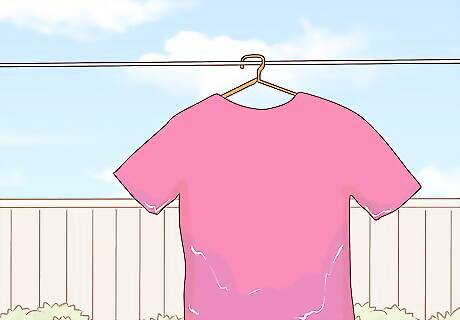
Line-dry the garment once the washing cycle is complete. Remove the garment from the washing machine. Hang it up on a clothesline or lay it out on a clotheshorse and let it dry fully before wearing it. If the garment hasn’t shrunk enough, you can always wash it in hot water again to try and shrink it further.




















Comments
0 comment